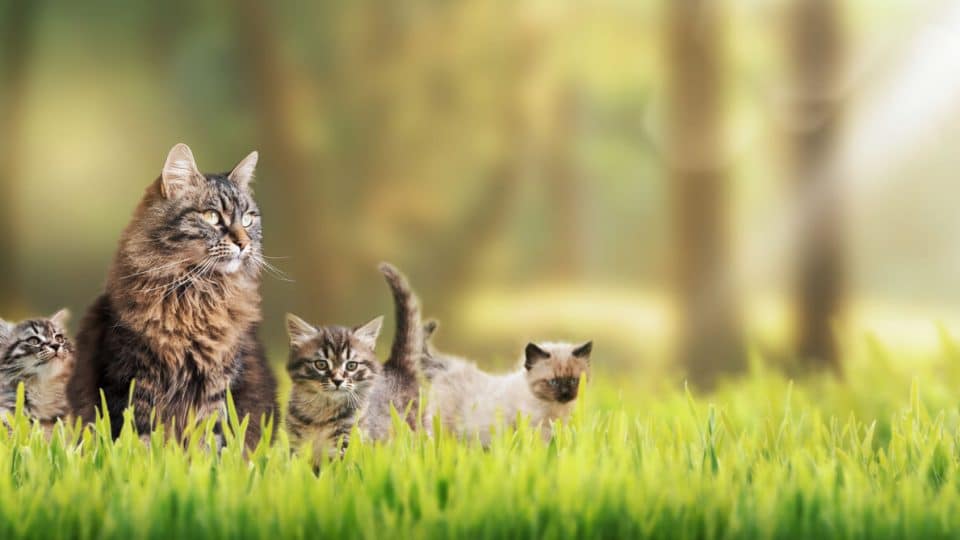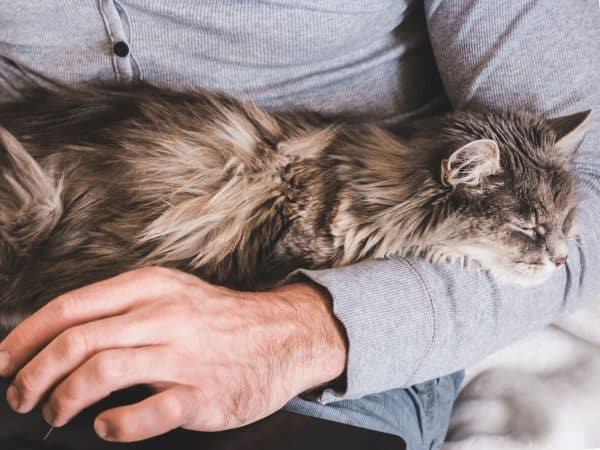Cats become young adults at the age of one year and mature adults at the age of seven years.
Your cat’s age can affect their medical needs, nutrition requirements, general health, and behaviours, explains Dr Preston Turano, a licensed veterinarian and spokesperson for Felix Cat Insurance.
So, an understanding of cat life stages can help you tend to these changes with support from your vet.
Below, we’ll share vet insights on cat life stages, what you can expect throughout each stage, and how to care for your cat as they grow older.
What Are A Cat’s Life Stages?
Cats go through the following life stages:
- Kitten: birth to one year
- Young adult: one to six years old
- Mature adult: seven to 10 years old
- Senior: 10-12 years and up
All cat breeds tend to age consistently, so the stages are similar for most cats, Dr Turano says.
Kitten Behaviour And Growth Milestones
The table below outlines kitten milestones, according to Dr Jennifer Sperry, DVM and veterinary advisor at Pets Plus Us.
| Kitten’s age | Behaviour and Growth Milestones |
| Two to four weeks |
|
| Six to eight weeks |
|
| After eight weeks |
|
| Three to six months |
|
| Around six months |
|
Your kitten’s growth will continue for their first year of life. Sperry says most kittens are fully grown at around 12 months old, but giant breeds, like Maine Coons, may continue to grow until they reach the age of two.
Cats also begin showing more mature behaviours and seem less kitten-like around the age of two.
How To Care For Your Adult Cat
“As your kitten becomes an adult, you should continue providing a safe and stimulating environment,” Dr Sperry says.
The following tips can come in handy when caring for adult cats:
- Offer cat food appropriate for their age, in the right portions for their size and weight.
- Play with your cat regularly and encourage them to continue playing and being active.
- Pay attention to your cat’s relationship with other pets and children in the home, as this can change as cats get older.
- Plan regular checkups with your vet to make sure your cat is growing and developing properly.
Do some cat breeds need special care?
Dr Sperry explains that some cat breeds need the following special care:
- Long-haired breeds. Cats with long hair may need extra grooming, and it’s important to brush their hair regularly.
- Flat-faced breeds. Cats with flat faces may need supportive care for breathing difficulties and regular face cleaning. They’re also more sensitive to heat.
- Giant breeds. Talk to your vet about the right type of cat food and portion sizes to support healthy growth of their larger skeletons.
- Breeds prone to health issues. Some breeds, such as Siamese cats and Himalayan cats, are prone to health issues and may need additional vet exams, screenings, and preventative care.
When Do Adult Cats Become Seniors?
Cats become seniors in their second decade of life, between the age of 10 and 14. Your cat may start slowing down at this age and seem less energetic.
However, even mature and senior cats still need regular play, exercise, and mental stimulation, Dr Sperry says.
Senior cats may also need some special attention to make sure they stay happy and healthy.
A few tips to help improve your senior cat’s wellbeing:
- Pay attention to any weight gain, which can increase their chances of developing chronic illnesses such as diabetes, urinary tract disease, and arthritis. Similarly, talk to your vet if you notice any sudden weight loss.
- Consider scheduling more frequent health visits with your vet to monitor your cat’s health, mobility, and comfort.
- Ask your vet about screening tests to monitor your cat’s internal organ function and hormone balance.
- Make changes to your cat’s environment and offer pain management for arthritis if needed.
If you have any concerns about your cat’s health or changes in their behaviour as they age, your vet can offer more guidance and support.




